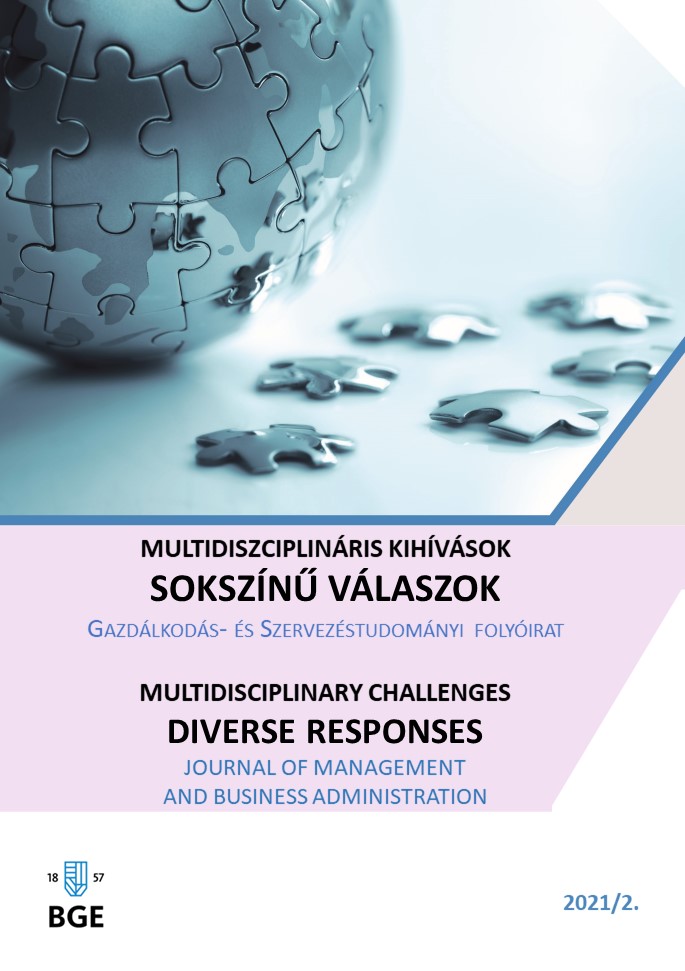Role of Knowledge Management in Managing Technology Competences
Abstract
A large amount and high quality of scientific resources are available for the conceptual definition and model-level examination of knowledge management. The present study attempts to link research and development, innovation, technology management and technological competence based on a theoretical summary of knowledge management. To this end, the theoretical findings of knowledge management will be further broken down into an approach on the part of research and development and innovation and technology management, followed by further interpretation through the known conceptual definitions of technological competence. The message of the definitions examined in the context of the industrial approach to technological competence is that technological competence is a common set of human and technical skills, which accordingly requires a comprehensive and complex management approach. The targeted areas and relationships articulated by the research questions will be explored along with the processing of literature sources and the drawing of conclusions. At the end of the study, conclusions are drawn that will prepare further research. It can be stated that there is no accepted methodology against the required technological competencies, and their measurement methods are only partially adequate. At the same time, it is an extremely important topic not only for companies but also for academies.
References
Abubakar, M. A., Elrehail, H., Alatailat, M. A., Elci, A. (2017): Knowledge management, decision-making style and organizational performance, Journal of Innovation & Knowledge
Aleksandr I. Kashirin (2018): Method of managing unique technological competencies. International Journal of Mechanical Engineering and Technology (IJMET) Volume 9, Issue 12, December 2018, pp. 1256-1266
Anagnostopoulos, C. N. (1998). Few gold stars for precollege education. IEEE Spectrum, 18-26. https://doi.org/10.1109/6.666954
Arballo N. C., Nunez M. E. C., Tapia B. R. (2019): Technological Competences: A Systematic Review of the Literature in 22 Years of Study, International Journal of Emerging Technologies in Learning, Vol 14, No 04 (2019)
Armand Hatchuel; Pascal Le Masson; Benoıit Weil (2002): From knowledge management to design-oriented organisations, International Social Science Journal
Bell, M., & Pavitt, K. (1993). Technological accumulation and industrial growth: contrasts between developed and developing countries. Industrial and corporate change, 2 (2), 157-211. https://doi.org/10.1093/icc/2.2.157
Bencsik, Andrea; Für, Klaudia (2015): Olcsó és okos – A frugal innovációs és a tudásmenedzsment szimbiózisa, XLVI. ÉVF. 2015. 12. szám/ ISSN 0133-0179
Bencsik, Andrea (2015): A tudásmenedzsment elméletben és gyakorlatban, Budapest ISBN: 978 963 05 9784 5
Berényi, László (2012): Kompetenciamenedzsment és irányításirendszer-szabványok, Debreceni Egyetem
Castro, G. M. (2015): Knowledge management and innovation in knowledge-based and high-tech industrial markets: The role of openness and absorptive capacity, Industrial Marketing Management
Demeter, Krisztina; Losonci, Dávid; Kovács, Zoltán (2017): A lean tudás megosztása, Budapesti Corvinus Egyetem, ISBN 978-963-503-666-0
Fehér, Péter (2005): A technológiák szerepe a tudásmenedzsment folyamatok támogatásában, Vezetéstudomány, Budapest
Fernández, M. R. (2003). Competencias profesionales del docente en la sociedad del siglo XXI. Revista Fórum Europeo de Administradores de la Educación, 11 (1).
Ganesh D. Bhatt (2001): Knowledge management in organizations: examining the interaction between technologies, techniques, and people, Journal of Knowledge Management Volume 5 Number 1 2001 pp. 68-75
Giget, M. (1997). Technology, innovation and strategy: recent developments. Internacional Journal of Technology Management, 14, 613-634. https://doi.org/10.1504/IJTM.1997.
Giget, M. (1984). The Bonsai tree of Japanese industry. FUTURES.
Grzybowska, K., Łupicka, A (2017): Key competencies for Industry 4.0, Economics & Management Innovations(ICEMI)
Hlupic, V. (2002). Knowledge and Business Process Management. (I. G. (IGI), Ed.) ilustrada.
Jia-Sheng Lee, Wan-Fai Chou (2009): The effect of knoledge management strategy of an enterprise ont he knowledge creation capability of R&D team members and their R&D performance, Taiwan
Kajati, György (2013). K+F, innováció és projektmenedzsment. Eger: Eszterházy Károly Főiskola
Kashif Akram; Suleman Hafeez Siddiqui; Muhammad Atif Nawaz (2011): Role of Knowledge Management to Bring Innovation: An Integrated Approach, International Bulletin of Business Administration ISSN: 1451-243X Issue 11 (2011)
Keczer, Gabriella (2016): A tudásmenedzsment és az emberi erőforrás menedzsment kapcsolata – A tudásmegosztás elősegítése a szervezetben, Szeged
Letmathe, P., Schinner, M. (2017): Competence Management in the Age of Cyber Physical Systems, Industrial Internet of Things (pp.595-614)
Mariano Nieto (2002): From R&D management to knowledge management An overview of studies of innovation management, Technological Forecasting and Social Change
Mihir, Parikh (2015): Knowledge Management Framework for High-Tech Research and Development, Engineering Management Jorunal
Morcillo, P. (1997). Dirección estratégica de la tecnología e innovación. Madrid.
Nieto, M. (2004). Basic propositions for the study of the technological innovation process in the firm (Vol. 7). European Journal of Innovation Management. https://doi.org/10. 1108/14601060410565065
Nonaka, I. and Takeuchi, H. (1995). The Knowledge-Creating Company: How Japanese Companies Create the Dynamics of Innovation. Oxford University Press, New York.
Pataki, Béla (2005): A technológia menedzselése, Budapest ISBN 963 9548 70 7
Prahalad, C., & Hamel, G. (1990). The core competences of the corporation (Vol. 68). Harvard Business Review.
Prahalad, C., & Hamel, G. (1994). Competing for the future. Harvard Business School.
Radu, L. D. (2020): Disruptive Technologies in Smart Cities: A Survey on Current Trends and Challenges, Smart Cities 2020, 3, 1022-1038, pp.3; doi:10.3390/smartcities3030051
Sh. U. Kosimov, M. R. Rafiqova, M. I. Murodova (2021): Implementation of the Technological Competence of Future Specialists. Scientific Research Publishing Inc. Creative Education, 2021, 12, 666-677; ISSN Online: 2151-4771
Stephen J. Kline, Nathan Rosenberg (1986): An Overview of Innovation. In Landau, R.-Rosenberg N. (1986): The Positive Sum. National Academy Press. Washington.
Tyler, B. B. (2001). The complementarity of cooperative and technological competencies: a resource-based perspective. Journal Engineering and Technology Manegement Jet-M, 18, 1-27. https://doi.org/10.1016/S0923-4748(00)00031-X
Vallejo, B. M., Gallo, J. J., & Plazas, C. E. (2016). Propuesta de una metodología para el estudio de competencia tecnológica en empresas fabricantes de medicamentos. Universidad & Empresa, 18 (31), 11-27. https://doi.org/10.12804/rev.univ.empresa.31.2016.01
Wu Yang; ZhongJing-jun; Sun Chang-xiong (2007): The Fusion Model of Knowledge Management and Communication Management in Research Organization, China


























